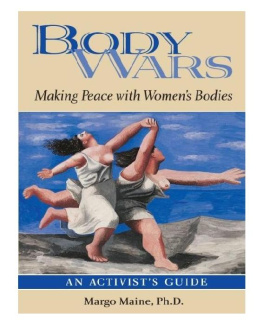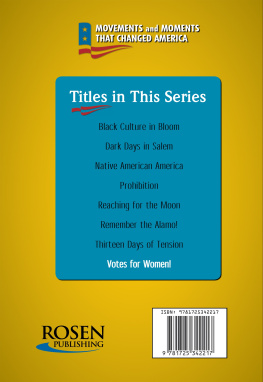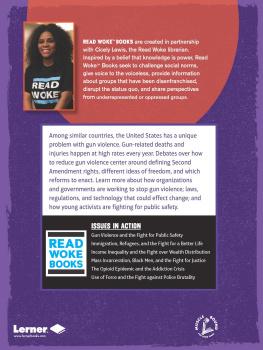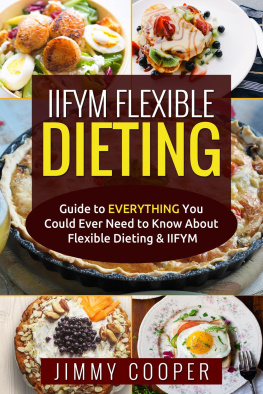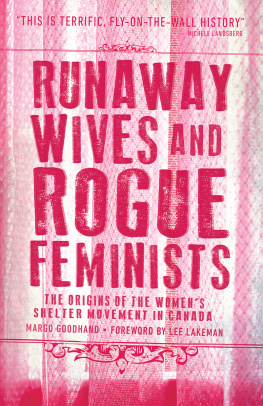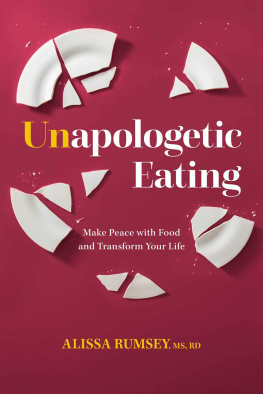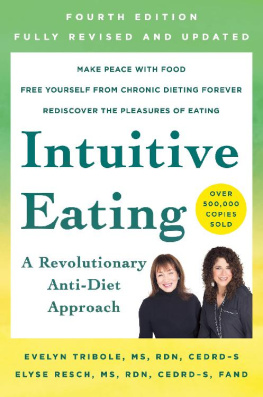Acknowledgments
There is a safety in numbers and comfort in connectionwe need each other in the fight against Body Wars. I thank my fellow crusaders for their support, their efforts, and their inspiration.
First, thank you to my husband, George Coppolo, for his love and understanding of the time devoted to my passion to end Body Wars. And deep appreciation to my other husband, Rob Weinstein, for his support and partnership in our clinical work. Many thanks to Lindsey Hall and Leigh Cohn of Grze Books for their dedication to this cause and their extraordinary effortsthey are far more than publishers, as anyone who knows them understands. I am also grateful to their staff, to Cate Baker and Susan Cakars for their editorial work, and to my associate, Michelle Gauvreau, for her secretarial support and endless enthusiasm for this project.
I have been blessed with wonderful friends who add much love, laughter, and light to my life. I am enormously grateful to all of you. I especially want to recognize my friends in Eating Disorders Awareness and Prevention for the zeal, energy, and clarity of purpose in their efforts. Thanks to the staff, the board members, the benefactors, supporters, and the countless volunteers across the country who dedicate themselves to the cause of preventing eating disorders. And thanks to my staff and clinicians everywhere who help women rebuild their lives after eating disorders destroy them. And finally, thanks to the patients who so bravely trust me as they struggle with recovery from Body Warsit is a great honor to be part of their lives.
These pages are full of numbers of the women affected by various Body Wars. Remember: statistics are people with the tears wiped away. Let us not be immune to the pain and suffering these numbers represent and let us commit to empower women, respect their bodies and their wishes, and enter the millennium dedicated to ending Body Wars.
About the Author
Margo Maine, Ph.D., author of Father Hunger, and Senior Editor of Eating Disorders: The Journal of Treatment and Prevention , is a clinical psychologist, Director of the Eating Disorder Program at the Institute of Living in Hartford, CT, and cofounder of Maine and Weinstein Specialty Group. Dr. Maine is a trustee and past-president of Eating Disorders Awareness and Prevention, Inc. and is an Assistant Clinical Professor in the Department of Psychiatry at the University of Connecticut. A lecturer, consultant, and researcher, she was also clinical consultant for the Blue Ribbon Award for Excellence winning film, Wasting Away, and is on the advisory boards of many organizations dedicated to womens health and eating disorders.
She has presented at numerous state, national, and international conferences including the American Psychological Association, American Association of Marriage and Family Therapy, American Women in Psychology, International Conference on Eating Disorders, National Anorexic Aid Society, International Association of Eating Disorder Professionals, The National Institute for the Advancement of Behavioral Medicine, and the Renfrew Foundation.
Bibliography
Chapter 1: The Challenge
American Psychiatric Association (1993), Practice Guidelines for Eating Disorders. American Journal of Psychiatry, 150(2), pp. 212-228.
Wolf, N. (1991), The Beauty Myth. New York: William Morrow, p. 53.
Brumberg, J.J. (1997), The Body Project: An Intimate History of American Girls. New York: Random House.
Wolf
Womens Research and Education Institute (1994), The American Woman.1994-1995: Where We Stand: Women and Health. New York: Norton, p. 309.
Gibbs, N. (1990), The dreams of youth. Time, Special Issue: Women: The Road Ahead, Fall, 1990, p. 12.
Wolf.
Wolf, p. 227.
Brumberg.
Steinem, G. (1994), Moving Beyond Words. New York: Simon and Schuster.
Halloran, L. (1999), No Holds Barred. Hartford Courant, September 6, 1999, pp. A1 and A5.
More, T. (1992), Care of the Soul. New York: Harper Collins.
Buchwald, E. (1993), Raising Girls for the 21st Century. In E. Buchwald, P. Fletcher, M. Roth. (Eds.), Transforming A Rape Culture. Minneapolis, MN: Milkweed Editions, pp. 179-199.
Chopra, D. (1993), Ageless Body, Timeless Mind. New York: Harmony, p. 8.
Margaret Mead. In Jackson, D. (1992), How to Make the World a Better Place For Women in Five Minutes a Day. New York: Hyperion, p. iv.
Chapter 2: Weightism
Wooley, S.C., Wooley, W.O., Dyrenforth, S. (1979), Theoretical, practical and social issues in behavior treatments of obesity. Journal of Applied Behavior Analysis, 12, pp. 3-25.
Brownell, K.D. & Rodin, J. (1994), The dieting maelstrom: Is it possible and advisable to lose weight? American Psychologist, 49(9), pp. 781-791.
Gaesser, G. (1996), Big Fat Lies: The Truth About Your Weight and Your Health. New York: Fawcett Columbine.
Fraser, L. (1997), Losing It: Americas Obsession With Weight and the Industry That Feeds on It. New York: Dutton.
Steiner-Adair, C. (1994), The politics of prevention. In P. Fallon, M.A. Katzman, S.C. Wooley (Eds.), Feminist Perspectives on Eating Disorders. New York: Guilford Press, pp. 381-394.
Rothblum, E.D., Brand, P.A., Miller, C.T., Oetjen, H.A. (1990), The relationship between obesity, employment, discrimination, and employment-related victimization. Journal of Vocational Behavior, 37, pp. 251-266.
Fraser, L.
Rothblum, E.D. (1990), Women and Weight: Fad and Fiction. Journal of Psychology , 124(1), pp. 5-24.
Gaesser, G.
Rothblum, E. (1994), Ill die for the revolution, but dont ask me to diet. In P. Fallon, M.A. Katzman, S.C. Wooley (Eds), Feminist Perspectives on Eating Disorders. New York: Guilford Press, pp. 53-76.
Fat Worker Wins $1 Million for Dismissal. New York Times, September 8, 1995.
Campbell, S. (1995), Immense determination to change peoples minds. Hartford Courant, July 4, 1995, pp. E1-E3.
Edell, D. (1992), Dr. Dean Edell Medical Journal. San Francisco Chronicle, December 31, 1992, p. D4.
Berg, F. (1995), Children and Teens in Weight Crisis, Hettinger, ND, Healthy Weight Journal, p. 6.
National Association To Advance Fat Acceptance. Size Acceptance Questionaire. Assessing Size Acceptance. From brochure, Supporting the Physical and Emotional Health of Fat People through Personal and Social Change. Reprinted with permission.
Rodin, J.(1992), Body Traps. N.Y.: William Morrow and Co.
Chapter 3: Obesity
Fraser, L. (1997), Losing It: Americas Obsession with Weight and the Industry That Feeds On It. New York: Dutton.
Rothblum, E.D. (1990), Women and weight: Fad and fiction. The Journal of Psychology, 124(1), pp. 5-24.
Gaesser, G. (1996), Big Fat Lies: The Truth About Your Weight and Your Health. New York: Fawcett Columbine.
Rothblum.
Rothblum.
Garrow, J. (1974), Energy Balance and Obesity in Man. New York: American Elsevier.
Stunkard, A.J. et al. (1986), An adoption study of human obesity. New England Journal of Medicine, 314, pp. 193-198.
Bennett, W. and Gurin, J. (1982),The Dieters Dilemma. New York: Basic Books.
Womens Sports & Fitness Magazine , Sept/Oct, 1998.
Gaesser.
Gaesser.
Gaesser.
Gaesser.
Garner, D.M., and Wooley, S.C. (1991), Confronting the failure of behavioral and dieting treatments for obesity.

